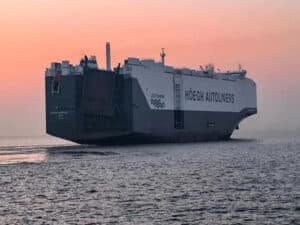
Pangaea bulker is the first to gain Silent (E) notation
Written by Nick Blenkey
Photo: Pangaea Logistics
Newport, R.I., based Pangaea Logistics Solutions Ltd. (Nasdaq: PANL) reports that its 95,000 dwt. post-panamax dry bulk carrier Nordic Nuluujaak has been awarded the Silent (E) class notation by, making it the first dry bulk carrier to ever receive the certification. The Silent (E) Notation is a select designation given to vessels with a demonstrated ability to effectively reduce environmental noise emissions, consistent with a focus on protecting sensitive marine ecosystems. Nordic Nuluujaak was built in 2021 at Guangzhou International Shipyard, along with three sister ships for which Silent (E) notation is under analysis.

“Every part of our oceans where we operate is environmentally important, particularly within the ecologically sensitive habitats where our ice class vessels transit, such as the Arctic Ocean,” said Pangaea’s CEO, Mark Filanowski. “Our newest vessels are not only designed to operate with lower carbon emissions, they also materially reduce underwater noise, positioning us to further reduce our overall environmental impact. With our industry looking for ways to mitigate ecological impact, hidden noise impacting underwater wildlife should be considered, as well. We are happy we took the first step in working toward Silent (E) notation for these four vessels.”
PORT FEE REDUCTIONS
DNV, which issued its first Silent (E) notation to a merchant vessel in 2021, notes that Canadian seaports offer attractive port fee reductions to vessels which comply with eco-friendly underwater noise standards.
These include the Vancouver Fraser Port Authority, which operates the Port of Vancouver, and this year introduced increased incentives under its EcoAction Program. Launched in 2017, the program offers shipping lines discounts on their fees for taking voluntary steps to reduce their environmental footprint.
This year it includes a new platinum level discount of up to 75% off harbor dues is for ships that:
- use low-emission, alternative fuels such as methanol, hydrogen or LNG
- use technologies to reduce emissions such as connecting to shore power, or wind or battery assist
- are certified as quiet vessels by a ship classification society, reducing underwater noise for the benefit of at-risk whale species.




